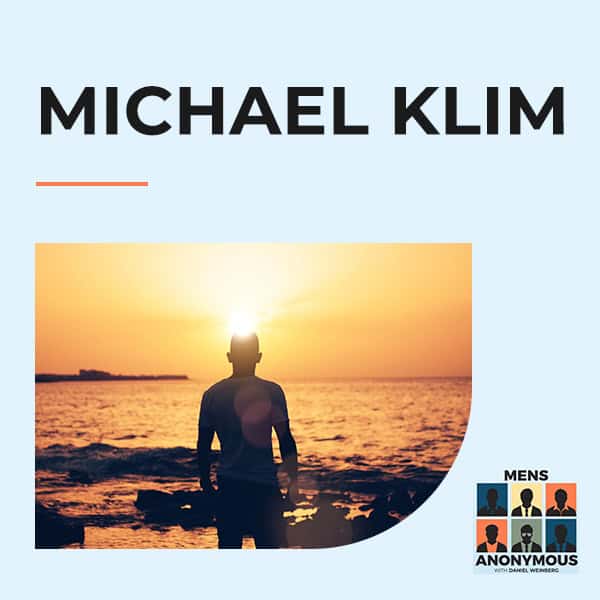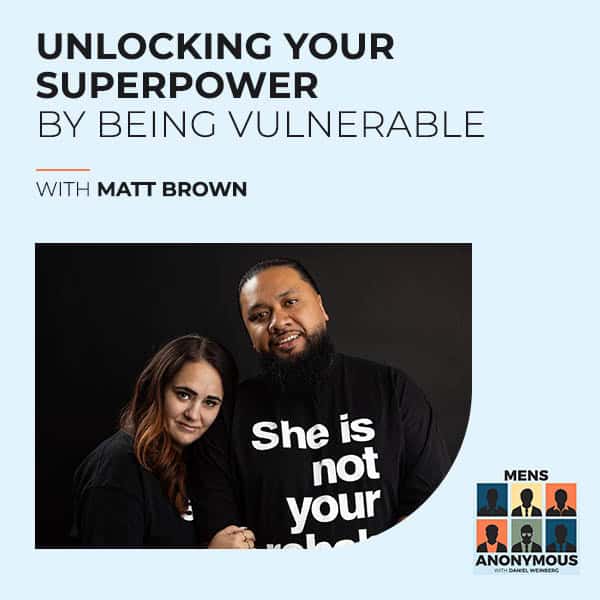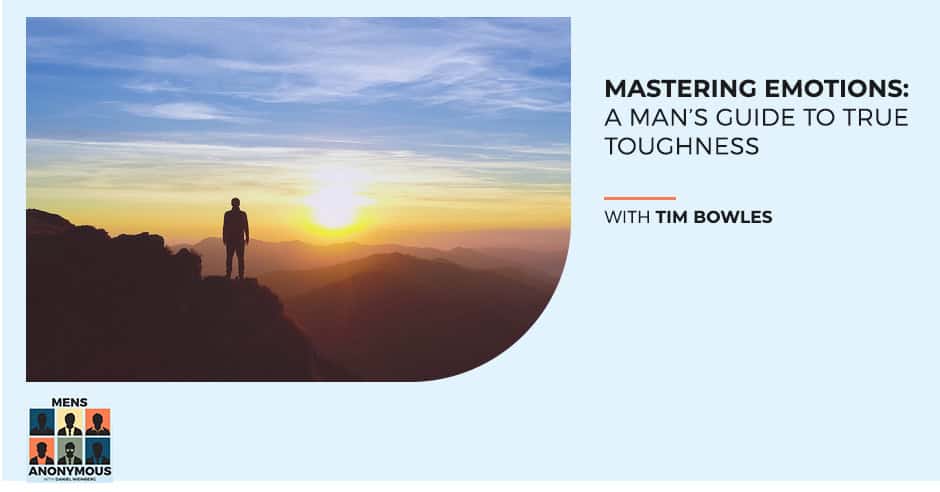
Society often suppresses men from opening up and expressing their genuine emotions. This is why men’s groups are extremely important, for in these gatherings they can be vulnerable and listen to other people’s stories. Daniel Weinberg sits down with Tim Bowles, co-founder of IceBreakers, a UK-based organization that offers safe spaces for men to connect and share without filters or limitations. Together, they discuss how cold water therapy, nature connection, and open conversations can help men get rid of anxiety, manage their emotions better, and unlock the best version of themselves. Tim also emphasizes the undeniable benefits of exposing men to non-judgmental spaces so they can be heard and get a chance to create new long-lasting connections.
—
Watch the episode here
Listen to the podcast here
Tim Bowles
Introducing Tim Bowles Of IceBreakers
In this episode, we talk to Tim Bowles from Icebreakers in the UK. We’ll go deep into what happens in men’s groups and why it has so much value and impact on men remains anonymous. Welcome, Tim. How are you?
Daniel, I’m great. Thanks. How are you?
Good. Where are you?
I’m at home on the family farm. We’re outside of Bath in England in the West Country.
You’re a country boy.
Born and bred on the farm, so I’m 5th generation. Though, farming wasn’t cool or exciting enough for me when I left school. I headed off on adventures elsewhere but I returned to the farm eventually and it feels like home. It’s good to be home again.
How long did you leave the farm for?
I went off to university in Newcastle and then went off to London for a year. I worked in advertising then I went off to Hong Kong for a few years. I worked as a wine merchant. It was such an adventure. I’ve always loved traveling, meeting new people, and getting outside. I felt quite drawn back to the country eventually. Hong Kong has beautiful country landscapes.
What years were you in Hong Kong?
That was from 2010 to 2013.
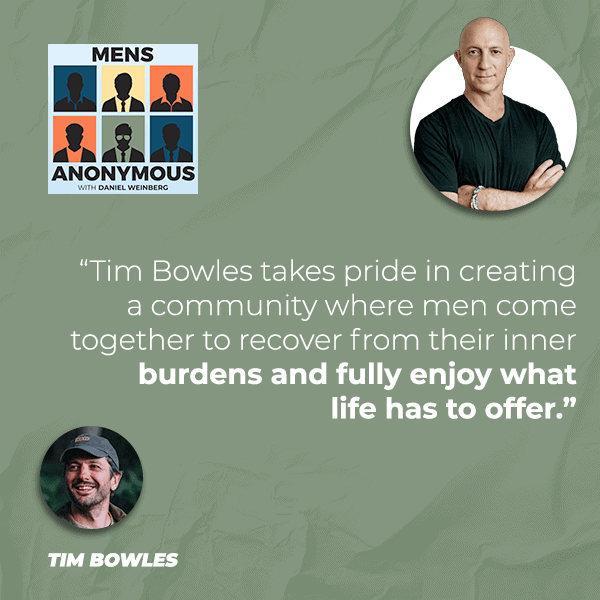
I missed you. I moved there in ‘15.
Things were starting to change.
You had good years.
It’s an awesome place and a lot of love for the people and my friends out there. I had some great times. It’s very special.
You came back to the farm post-Hong Kong, is that what you’re saying?
After Hong Kong, I had this mad dream that I wanted to move back and set up a campsite or a glamping thing but with a real wildness to it. It was quite a contrast, going from the concrete jungle back to the farm and the land. There’s something about it that appealed to being the creator of my destiny and giving people experiences out in nature on our farm. Being close to Bath, we’ve got beautiful valleys, rivers, and nature on the doorstep. I wanted to connect people with that. That was years ago.
That’s still a concern?
That’s my main business. That’s called Campwell. We started with three tents and then we’ve got two sites both near Bath. We can take up to 60 odd people in total. It’s a lot of retreats, groups, and families. We get corporate teams.
What do you do? What’s the schedule when you’re there?
It can be pretty unique to the needs of the group. We’re off the grid so we celebrate that offline feel of modern lives. It’s quite precious to have that quality time around the campfire with loved ones or people who you spend a lot of time with or maybe a lot of teams calls with or whatever it might be to get people slowing down and switching off around the fire. It’s amazing how people open up if you give them that space to do so. Boiling a kettle over a rocket stove. It’s so much more mindful and present. Things flow better outside I find.
It’s connected to nature in general.
It’s all science back and we always knew it. The wisdom was always there but it feels like a lot in the modern world. They need the science to have backup and reassurance that it’s a real thing. Nature’s good for us.
It is amazing how people open up if you give them the space to do so. Share on XThat led you to Icebreakers. Is that correct?
We created a day. It was in October 2020. It was inspired by myself and a friend, Aaron, who’s a Qigong and well-being practitioner. We held retreats together at the camps and noticed it was mostly women who were coming to them. I have nothing against women. They’re very natural at connecting and looking after themselves. We felt that we needed to create a space for men. It was also inspired by losing a friend to suicide in Hong Kong. Aaron and I lost a mutual friend who was a family friend. We felt that we wanted to do something about it.
Around that time, I knew eight men who took their life. It was horrible. At the time, I’ve had my mental health struggles with anxiety and feeling how crippling that can be and suffocating. It inhibits your enjoyment of life. I was on my journey to recover and enjoy life more. Fortunately, I’ve found the tools over the years to manage that but I also wanted to share that with other men that I knew that were suffering in silence.
Finding The Right Tools On Self-Care
How did you find the tools originally when you were going through that? When you’re going through that, you’re so debilitated. It’s hard to even have the inner strength to find the energy to even think straight. What was your opinion in terms of how you took yourself out of it?
The conditioning that a lot of us men have had is that we’re brought up in a world where you toughen up and don’t show your emotions. I played a lot of rugby, drank too much, and had a lot of fun. Eventually, when the reality of life, responsibilities, and everything came about in my twenties, I felt this pressure and anxiety building out. I didn’t even have a language for what I was going through. That emotional vocabulary was completely lacking.
Were you able to express or share it with other men around you or you kept it to yourself?
In the early days, I kept it to myself and it didn’t help. I can remember having sleep issues and that can drive you mad.
For a six-month period, I could not sleep.
It’s brutal. You wake up in the witching hour, they call it, 3:00 or 4:00 in the morning. It’s part of your brain that switched on and it’s not rational. All the fears subconsciously rise up. Sometimes, I wake up if I’m going through work stress. My heart’s thumping. All these fears feel so real.
You’re talking about the chatter in your head.
That itty-bitty-shitty committee, which is what I’m on a mission to quieting and eradicate. Particularly for men, because we do get stuck in our heads. If we’re not expressing it like you’re talking about, that can be dangerous or unhealthy. I can remember being in a pretty desperate place and not sleeping well. I was starting up the camp. I had a bit of stress in Hong Kong but nothing like when I started my own business.
I can remember trying all these different things. Exercise has always been a big thing for me. I can be trying breathwork and meditation, the Headspace app. I was doing fifteen minutes a day. Slowly, I felt this tension dissolve a little bit and it was magic. My patience started growing. My positivity and enjoyment of life slowly improved a little bit. I can’t pretend it was all perfect.
Not expressing the thoughts stuck in your head can be dangerous and unhealthy. Share on XIt happens in a very iterative process. “Take a pill. Boom. I’m better.” It’s on a very disciplined basis on daily basis. Even the discipline doing that activity, forget about what it can do for you. The discipline of it is already rewiring your brain effectively. It’s taking you out of that zone that you’re in. It’s all these things like the base value. It could be journaling, for example. I started doing that five-minute journaling story, which has been going on for a long time. It’s that discipline of doing those things. It starts changing the way that you think and what you manifest.
We shouldn’t underestimate the power of these tools. They’re becoming more mainstream, which is fantastic. It’s that act of self-care and the ritual of that. You use the word routine or routine ritual. You can make it as deep as you like. We’ve got to be looking after ourselves because life can be intense. To process it, it’s like finding a toolbox, whether it’s journaling, breathwork, or qigong.
What was your toolkit?
At that time, it was this Headspace app, which is around mindfulness meditation. I’ve come back around to meditation and it’s a huge help to me. Every day, I practice. It shifts the energy so that my subconscious mind is calmed. In my childhood, my family broke up. There’s part of me there that was insecure and unsettled by that. That shows up in my adult life.
At what age were you that that happened?
I was around 4 or 5 years old. It was formative years.
Do you remember much of it?
I have some memories and none were particularly special around that time. I also have beautiful memories of being on the farm. Feeling that my family has dissolved can create an insecurity subconsciously that’s then shown up in my adult life as worry around business or relationships. It’s taken until now for me to understand that that experience when I was young is probably the cause of some of these struggles. To acknowledge that has been powerful for me, to be kind to myself and understand myself better.
That was years ago that I’ve been on that journey doing the inner work, which sounded like utter woo-woo nonsense. Back in the day, I thought even yoga was a bit weird. Whereas now, everyone’s doing it. It’s so normalized, which is so important. This is the thing over the years. I went to yoga. When I came back from Hong Kong, I did an intensive yoga course with a mate who was an old rug. It’s brilliant that this is all normalized again because men need this stuff.
We’re emotional creatures too and we need to shift that blocked energy. They say emotion is energy in motion. If we let it flow, then things heal and pass. If we don’t process them, then we get blockages and that can then show up as anger, sadness, or depression. It’s important to feel the feeling and then let it go somehow. All these tools that we’ve touched on are important for men. Particularly, they need that toolkit either given to them or tested out for size.
Structure And Methods Of IceBreakers
It is effectively what you’ve done with Icebreakers. This is your idea of how you can bring men together and give them some of that toolkit. Why don’t you walk us through the structure of Icebreakers? What inspired you or motivated you to create this?
Going back to the October 2020 day, we called it Mankind Day. It was a day just for men to come together. We brought a few features into that day that we felt would be the most impactful with the time that we had and got a feel for a men-only space. Aaron led breathwork and some movement that’s qigong-inspired. He’s a qigong instructor. We sat around the campfire at Campwell and shared where we were on our journey.
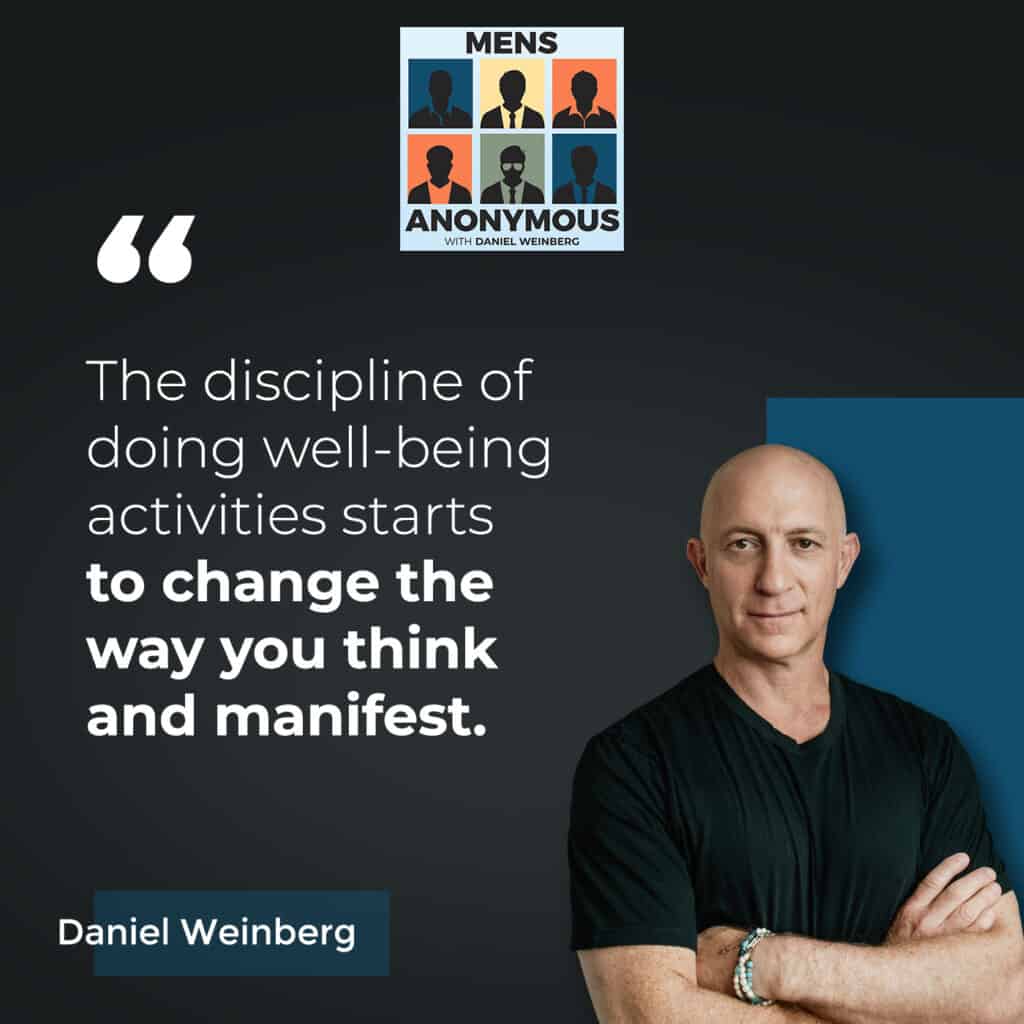
How many men are we talking about?
I think it was maybe 16 to 20.
What gave these men the courage to open up in front of a whole lot of other men? That’s not natural for men to do that.
Good point. I can remember that fire circle. It’s a vulnerable place. You’re right. For a lot of men, that’s too much.
Can you explain how it works? Who leads it? What’s happening? You’re around the fireplace. Who’s driving?
You’d have a facilitator or a host, which is something that I enjoy doing myself. What you do is you can set the scene. We can be ceremonial with it as well. We have an ashes ritual, which connects all our campfires and things like that. We bring in the importance of talking openly and honestly, sharing where you’re at in life, what’s challenging you, and what’s flowing but also try not to give too many parameters and boundaries in place.
You want to allow people to speak freely and know what’s going on with them without giving them too much of a guardrail situation.
There’s the concept of the talking stick. I don’t know if you’ve heard of that one.
Explain it to me.
Whilst we don’t use a stick, it’s around the importance of listening.
Whoever’s got the stick is the one that speaks. Everyone else must be silent and actively listening.
Exactly. That gives men the opportunity to talk more openly and honestly, and by not being interrupted, which is very easy for men to do, share their story, hijack, and so on.
What are the rules of engagement then? The man who’s got the stick is doing the talking. Let’s say he’s going to say, “I’m having a tough time. My child in school is playing out,” or whatever it is. Is it ideal for people to ask questions or is it for people to say, “That’s something that resonates with me. I’d like to talk about something similar that’s happened to me?” I want to make it clear to the audience. It’s not, speak because everyone can go and give you advice. Everyone wants to jump in and say, “I’ve got an idea of what you can do.” It’s not about that. It’s about allowing the man to talk and for him to be heard.
Most of the time, your childhood experiences are the cause of your present struggles. You just have to acknowledge it and be kind to yourself. Share on XOften, particularly with men, we can have these thoughts, ideas, and emotions within us. We don’t let them out. To get stuff off your chest is a form of therapy. It’s a talking therapy. You can say what you like. There’s no judgment. By creating that space, things can come out that they might not have even thought about.
Why don’t you describe that October ‘20 scene sixteen men? How did that play out?
Some groups sometimes take a little bit of opening up. You have to feel into the dynamic of the group and where they’re at on their journey. Some men have done some inner work already. Others are bricking it and turning up. We still experience that and I totally get it. It takes great courage to step into this space. What it often takes is one person to be vulnerable and share, “I’m going through hell. I’m experiencing this and I feel like this.” As you say, whilst we don’t interrupt people or try and fix them, this is the important thing.
We shouldn’t be giving advice unless we’re invited or asked to. It’s a space to listen non-judgmentally. By doing that, you can feel a pressure easing. The group naturally becomes more connected. All of a sudden, you get comments like, “I feel like I know you guys. I’m more connected with you than some of my best friends I’ve known all my life. I put my mask on with them.” We can get that within a couple of fire-sharing circles on a camp weekend. You can see the shifts in people, the laughter, the tears, and the letting out of this stuck energy. It’s a good medicine.
You created Icebreakers.
Off the back of that, that day, we had a number of other features but we walked into the valley here, which is beautiful. We went for a dip in the river. I’m sure you and your audience are very familiar with the benefits of cold water. That was a few years ago when Wim Hof was quite an extreme athlete, walking in his underpants through the snow in the mountains. I can remember seeing that and being like, “There’s something about that that appeals to that discomfort zone thing.”
I’d always enjoyed swimming in the river as a kid and being by campfires, funnily enough. With the cold water, there was a bit of science coming out about it. The dip in the river was the highlight of the day. The feedback was that it was the experience and the tool that had the greatest shift in energy. We felt it and saw it. You see it in people’s faces. They go in stuck in their head, “This is going to be shit.” It’s like you’ve got a different person. There are smiles and celebrations. It’s shaking out that energy.
It’s like pressing a reset button. It’s amazing how that cold water will shock. You’re so focused on getting through that discomfort. It’s unpleasant, let’s be honest. Even when Wim Hof gets into his ice bath, he’s not enjoying those first few moments. That itty-bitty-shitty committee shuts up. You focus on getting through that cold water shock. What we formed and we did on that day was we sandwich cold water dip. We call it a warm in and a warm out with the cold in the middle.
We do a bit of breath work, qigong, and movement, which is qigong-inspired. That prepares the mind and body for the cold-water shock. After the cold water, it’s important to warm back up. It can be a pleasant experience. A lot of people do cold water and shiver all day. Whereas it doesn’t have to be that way. We do movements that warm you back up.
After that day, the feedback was, “Let’s keep doing this.” We thought, “Let’s do weekly dips.” This was COVID. We’re starting to lockdown everything but it took off very quickly. This was in Bath in the river. I can remember a frosty, icy cold morning. Everyone was there barefoot on the ground. We were doing this breathwork and movement. We had 30 guys turn up at one of our first dips. They’d seen us on social media and they were like, “I don’t know what’s going on in the world but I’m called to this.”
It is a vulnerable place as well. You have to be courageous to go up and join these madmen. It’s quite feminine practice, breathing, qigong movements, and then jumping in the river. From the off, we were like, “This is a wellbeing space. This is not a rugby team. We listen more than we talk.” People got that. We didn’t even need to verbalize it too much. It was like, “This is around looking after our mental health and creating community.” It’s grown and grown since then. We’ve realized that the cold-water practice is an incredibly powerful tool. The community has become the most important part of this.
Campfire Sessions Without An Actual Campfire
What’s the dynamic between everyone? They’re doing the practice of it. Having open campfire sessions without the campfire talking, how does it work?
It is a form of therapy for men to get ideas and emotions out of their chest. Share on XThere are a number of branches to what we do. With the scale that we’re at, the Bath community has around 170 on the WhatsApp group. We’ve had many more that have come, gone, left and that sort of thing. We can get up to 30 by the river each week. Sometimes it’s 10 or 30. That’s often 8:00 AM on a Sunday. We call it Sunday service. You can call it the church or the pub. It is what it is. Call it what you like.
We go through that ritual. We dip and then finish with a cup of tea. If you’ve got time, you can hang around and chat. It’s a space that’s open to other male conversation. We talk about rugby, football, and so on but it’s a space for sharing troubles, challenges, wins, and everything else in life. We’ve got such diversity in the community. It’s brilliant. Whatever labels you carry or what work you do, it doesn’t matter. We’re all half-naked in this cold water. It often takes a long while until people know what each other does for a living.
All the clothes have been taken off.
Also, all the masks. What else has come about from the dips is we have weekly saunas. For most of the chapters, we’re in Brighton and North London.
This can be rolled out globally. You have a little system pretty much and it can easily scale.
That would be the dream. We’re speaking soon to a number of other locations around the UK about a number of other chapters. We’re excited by that. It’s about creating this community space for men. That’s not the pub or the sports game, which we all love but we need other spaces as well.
Real-Life Impact Of Joining Men’s Groups
Can you give any stories where you can say that you witnessed how impactful this has been? It can only accept and understand the health benefits but overall, it is this cold water and anti-inflammatory. It’s more than that. It’s all about the community and these guys who come in because they want to experience it with other men. Otherwise, it’s like having a shower by themselves.
It’s a big connection piece. It’s a connection to yourself, local men, and the outside. We are nature so to connect with that is a human need. Notice what’s going on through the seasons, feel that, and have those moments where when we breathe, we’re in silence. A lot of men aren’t doing these things or haven’t ever done them. It’s a bit uncomfortable to start with but it soon loosens up and becomes what we do, which is to warm up.
In terms of stories, there are many. I’ve heard men say that we’ve saved their lives. We had a day where we went on a walk, had a dip, and finished with breakfast. One of the guys shared how his wife is so grateful that he can come back in such a Zen state after a couple of hours with us. That’s it. The ripples of this practice in these spaces are that relationships and families are happier.
When men are better, the world is better. We’ve been brought up in the world often by our fathers and grandfathers, where they recovered from world wars. There’s trauma often that hasn’t been healed that can be passed genetically or energetically in the home. To allow men to feel who they are and process their emotions is the healing space.
There’s another example of a great guy who we were fond of in the community. I recall he was on the WhatsApp group for many months. He openly declared that he thought we were all mad at what we were doing. He suffered from extreme anxiety and depression. He was in a bad place. He was an Aussie guy. He eventually plucked up the courage to come and join us.
I can remember seeing the shift in his face and body. The transformation was phenomenal. The cold water in itself was an incredible tool for him. He was in there every day for many months. He has this contagious laugh and smile. He had this self-love that developed and he started looking after himself. He lost loads of weight. He started getting into exercise. It was a beautiful thing to witness. He was so grateful to have that community as well. He’d be there.
Funny enough, he didn’t always like joining our warmups and things but he loved being amongst us. That was life-changing for him. He was able to feel joy again and connection. He felt pretty hopeless. He’d lost a lot of hope. That’s the difference that can make. It’s beautiful to hear when we get feedback like that. We’re all volunteering. We’d love to get proper funding one day and scale it. We’d like to transition to a charity and so on. When you give so much of your time and energy to create spaces like this, hearing those words makes it all worthwhile. It’s something we’re immensely proud of.
Answering Five Final Questions
That’s amazing. Tim, you are doing phenomenal stuff for men. I commend you and thank you. To finish off, I’d like to ask you five quick questions that I always ask my guests. I’ll start with who would you like to say sorry to given the chance?
It’s a bit of a hard one on me but I feel like I’d like to say sorry to my mate, Tom, who took his life. I didn’t see it coming. I wished I’d seen that in him and supported him. It wasn’t to be. I love that guy and I miss him.
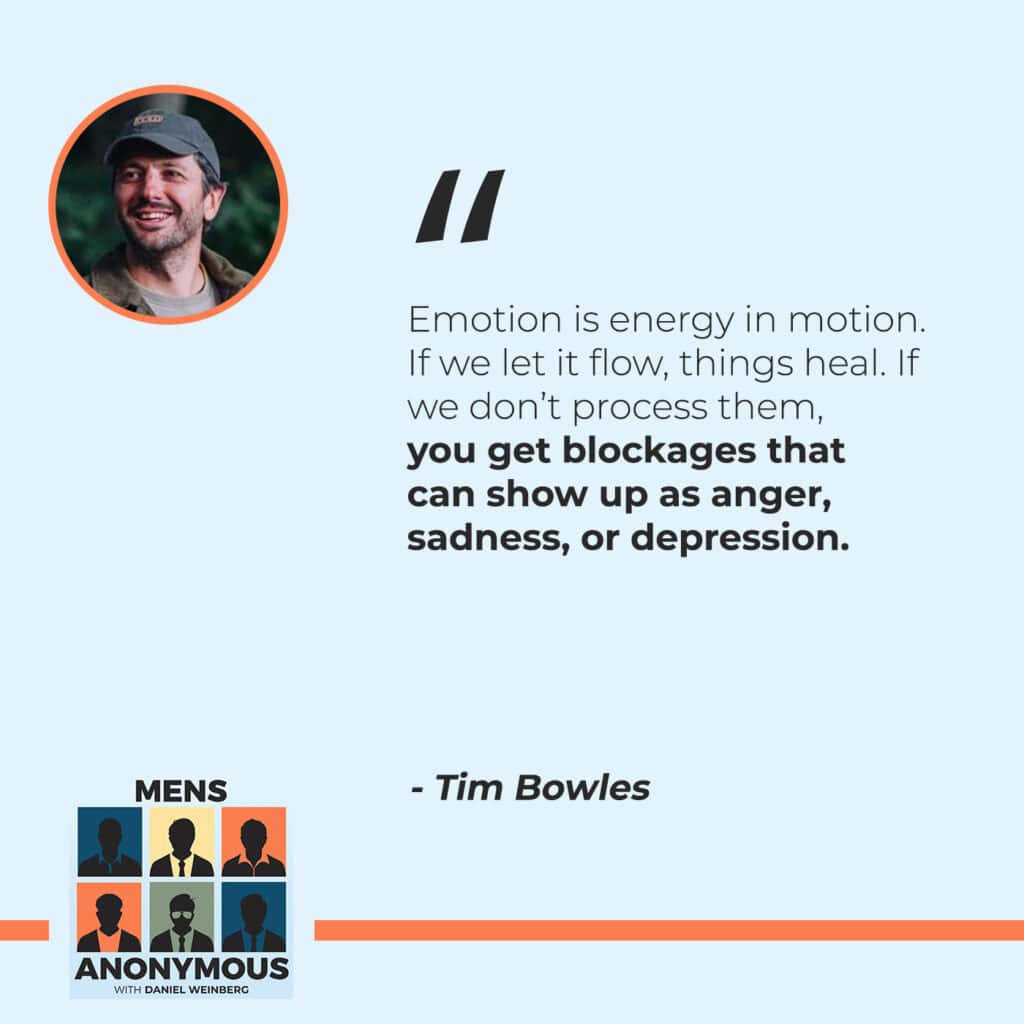
What are you proud of being or doing in your life?
It’s got to be being one of the founders of Icebreakers. It something that gives me so much pride. Seeing the difference that we’re making to other men, their families, teams, and so on is magical. I feel very lucky to be on this journey.
You should be. When did you receive kindness while needing it most and expecting at least?
It’s when I went to Hong Kong. My good mate who I went to visit, Eddie. He invited me over to Hong Kong and stayed with his family. I had an inkling that I wanted to work there. We did the Hong Kong Sevens and partied hard. His family was kind enough to put me up and look after me. We were in a right tangle and had a lot of fun.
At the end of the week, his mom offered me a job in her wine business. Despite seeing me in those states and having to put up with me, she still saw some potential in me. It was probably the greatest job I ever had being employed by someone else. She was a wonderful woman and very inspiring. That time in Hong Kong was incredible. It was such an adventure. I’m so grateful for her.
What did your mother or father teach you that you frequently remind yourself of?
My dad particularly was always very caring and kind. He’d always show up, mop up the mess, and not moan. He’d always show kindness and support. I always felt like he had my back. I like to think I’m doing that for my kids. Most of the time, they can be testing. That was something that stuck with me. I always felt like he had my back. I’ll call him up and say, “Dad, what am I going to do about this?”
He’s your first call.
Yeah, like the fire-sharing type of talks but a lot of other things. He’s super kind.
Finally, what’s your superpower?
It’s probably holding the space for people to talk. I feel like I can listen well, understand, see, and hear people. They feel comfortable to talk in my presence. I feel very privileged that people share things with me they maybe wouldn’t share with others. I like to think that I can help them in their life and with challenges. Hopefully, it creates more ripples and progress for them in their lives.
It sounds like you also enjoy it.
I love it. Campwell is evolving into a place. I’ve been doing it for years. I’d like to do more coaching and facilitation. I’m a trained-up coach and I love that work as well. I’d like to bring that particularly with men, getting them out outside more and feeling more alive.
Tim Bowles, thank you so much. Congratulations on what you’ve achieved so far. I hope to see it scale and grow to where you want to take it because it certainly will have an impact on a lot of men out there.
Thank you, Daniel.
Important Links
About Tim Bowles
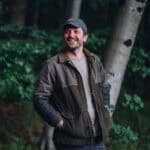 Tim has always loved the outdoors since a young boy. The world slowly convinced him life would be better inside, but he has fought his way out to start his own off-grid retreat business (Campwell.co.uk) and a men’s cold water swimming community (icebreakers.uk) that is keeps him feeling alive and true to his roots.
Tim has always loved the outdoors since a young boy. The world slowly convinced him life would be better inside, but he has fought his way out to start his own off-grid retreat business (Campwell.co.uk) and a men’s cold water swimming community (icebreakers.uk) that is keeps him feeling alive and true to his roots.










